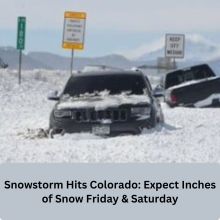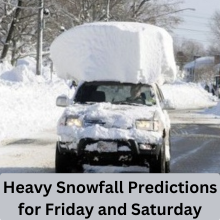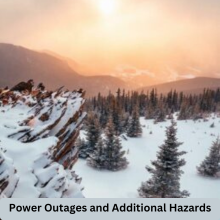
As Colorado braces for one of the biggest snowstorms of the season, residents are preparing for several inches of snow to fall this Friday and Saturday. The storm, which began earlier in the week, is expected to drop even more snow across the state, causing disruptions to travel, schools, and daily life. Here’s everything you need to know about the storm, including snowfall predictions, road closures, and how to stay safe in the coming days.
The Colorado Snowstorm – An Overview
Colorado has been hit hard by a severe winter storm, and it’s only going to get worse before it gets better. This major storm has already dropped over a foot of snow in some parts of the state, with more expected through Friday and Saturday. Governor Jared Polis has even declared a disaster emergency as snow continues to pile up, creating dangerous conditions for travelers and residents alike.
When Did the Storm Begin?
The snowstorm began earlier in the week, and it’s now into its third full day. Since Tuesday, heavy, wet snow has been falling across Colorado, with some regions already seeing significant accumulation. Areas like Arapahoe County have received as much as 13 inches of snow, while Jefferson County has reported more than 20 inches in some areas. The snow is expected to continue through the weekend, with Friday and Saturday being the heaviest days.
Pinpoint Weather Alerts – What They Mean
Friday and Saturday are designated as Pinpoint Weather Alert Days by the meteorological teams in Colorado. These alerts are issued when conditions are particularly severe, and the weather is expected to cause significant disruptions. During Pinpoint Weather Alert Days, residents are urged to be extra cautious, especially when traveling or going outdoors.
Heavy Snowfall Predictions for Friday and Saturday
As the storm progresses, snow accumulation is expected to continue. The Denver metro area could receive up to a foot of snow by Saturday morning, while other areas, especially to the east of Denver, could see 10-20 inches of snow. Snowfall rates could reach 1-2 inches per hour on Friday, with the heaviest snow falling late in the afternoon and through the night.
Snowfall Totals by Area
For the Denver metro area, expect anywhere from 6-12 inches of snow through Friday and Saturday. The Eastern Plains, including areas like Limon, Strasburg, and Brush, are likely to see much heavier snow—up to 20 inches in some places. These areas are at the greatest risk for travel disruptions as snow accumulates rapidly and roads become impassable.
When Will the Snow Fall?
The heaviest snow will begin falling by Friday morning and continue into Friday night. Snow will fall at a rate of 1-2 inches per hour, making it difficult to keep up with the accumulation. By Saturday morning, the snow will start tapering off, but parts of the Eastern Plains could continue to experience snow throughout the day.
The Storm’s Duration and Its Effect on Travel
This snowstorm isn’t a short-lived event. While the worst of the snow will fall on Friday afternoon and evening, the storm will last through Saturday morning. If you’re planning to travel, be aware that road conditions will be hazardous throughout the weekend. Major highways such as I-70, I-76, and Highway 40 have already been closed in some areas due to snow and ice.
Winter Storm Warnings – What You Need to Know
A Winter Storm Warning has been issued for most of Colorado, which means that snow, sleet, and freezing rain are expected to cause dangerous travel conditions. These warnings typically indicate that significant snowfall will make roads treacherous and power outages are possible.
Road Closures and Travel Disruptions
Due to the heavy snow, several major roads are currently closed. I-70, one of the main east-west highways in Colorado, has been closed in several areas, particularly east of Denver. I-76 and Highway 40 have also been shut down in places. These closures are disrupting travel not only within Colorado but also to neighboring states like New Mexico and Kansas.
Power Outages and Additional Hazards
The snow is heavy and wet, which increases the likelihood of power outages. The weight of the snow could cause tree branches to break, bringing down power lines. If you live in an affected area, be sure to have emergency supplies on hand, including extra blankets, flashlights, and bottled water. Keep your phone charged and stay tuned to local news for updates on power restoration.
School Closures and District Impact
With snow accumulating rapidly and roads becoming dangerous, hundreds of schools across Colorado have closed for the day, including major districts like Denver Public Schools, Aurora Public Schools, and Cherry Creek School District. Many districts have decided to close schools for Friday, extending the winter break for students and giving teachers a much-needed day off.
School Districts Affected by the Storm
The snowstorm has caused widespread closures throughout Colorado. Jeffco Public Schools, Douglas County Schools, and Cherry Creek are among the largest districts affected. Parents should check the district’s website or local news stations for updates on school schedules.
Extended Winter Break for Some
For students, this snowstorm means a bonus long weekend. With schools closed on Friday, students can enjoy an unexpected break. However, this also poses challenges for families who rely on school services, like meal programs or child care. Keep in mind that the snowstorm may affect school reopening times if conditions don’t improve quickly.
Preparing for the Storm
As the storm continues, it’s essential to be prepared. Ensure that your home is winterized—check that windows are sealed, your heating system is working properly, and that you have a supply of essential items like batteries, food, and water. If you need to travel, make sure your vehicle is stocked with an emergency kit and avoid driving unless absolutely necessary.
Winterizing Your Home and Car
Before the storm hits, take a few simple steps to ensure that your home and car are ready for winter weather. Make sure you have snow shovels, extra blankets, and a first aid kit. For your car, check your tire pressure, fill up your gas tank, and keep extra windshield fluid on hand.
Also read: Popular Brie Cheese Recalled in 12 States Over Listeria
How to Drive Safely in Snowstorms
If you absolutely must travel during the snowstorm, do so with extreme caution. Drive at a slower speed, keep a safe distance from other vehicles, and make sure your headlights are on. Avoid using cruise control on icy roads, and keep an emergency kit in your car just in case.
What Comes After the Storm?
Once the snow stops falling, Colorado will experience calmer weather. Saturday and Sunday will see a break in the storm, with temperatures starting to warm slightly. The snow will start melting, but expect slippery conditions in the morning. After the weekend, the weather will stabilize, but you’ll need to watch for lingering icy patches on the road.
The Return of Clear Skies – Weather for the Weekend
While Friday and Saturday will be snowy and chilly, Sunday promises clearer skies. Expect breezy conditions and highs in the 50s, which will help melt some of the snow. The next few days will be much calmer, with no more snow expected.
Also read: Historic HBCU Fire: Knoxville College’s Elnathan Hall Lost
FAQs
-
How much snow is expected to fall in Denver this weekend?
- Denver is expected to receive up to a foot of snow by Saturday morning.
-
Which major roads are closed due to the snowstorm?
- Major roads like I-70, I-76, and Highway 40 have been closed in parts of Colorado.
-
Why are schools closing across Colorado?
- Snow accumulation and dangerous travel conditions have prompted widespread school closures.
-
How can I prepare my home and car for heavy snow?
- Winterize your home, check heating systems, and stock up on emergency supplies. Make sure your car is ready for winter driving with proper tires and an emergency kit.
-
What’s the weather forecast for Colorado after the storm ends?
- After the storm, expect clearer skies and temperatures in the 50s for Sunday and Monday.

